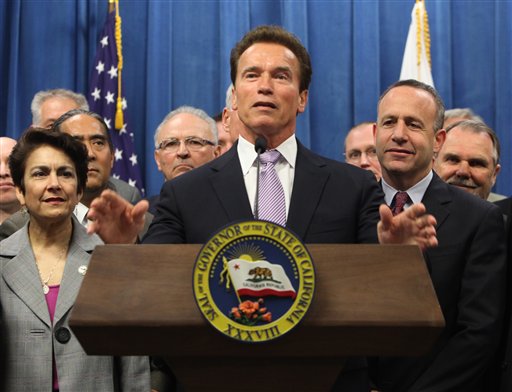California budget follies

California Democrats hoisted an alternative budget plan last Tuesday that would require few if any budget cuts. However, this is just another in a long line of increasingly desperate and risky plans by both parties to balance the budget by grabbing assumed future revenue, selling bonds based it, then hoping everything somehow works.
Or, if it doesn’t, at least maybe you won’t be in office then.
This is no way to run the most populous state in the nation, especially when it’s having crushing budget problems. Look, my politics are to the left of liberal, and this Democratic plan sounds to me more like a parody from The Onion than a serious proposal.
The plan is to raid the state soda bottle deposit fund for the next 20 years, then get an $8.7 billion loan from Wall Street which would be financed by an oil severance tax - and then swap state tax for local tax to get around the two-thirds majority rule for a budget to pass. Gosh, what could possibly go wrong with that?
I’ll bet you didn’t even know California had a soda bottle deposit fund. But to, in effect, steal that future assumed revenue to fund a deficit now is extraordinarily irresponsible. And if legislators think they will be able to float $8.7 billion of bonds from Wall Street on anything like reasonable terms given the state’s dire financial ratings, they have a rude shock in store.
That money will be expensive. Furthermore, I assume that local municipalities will fight any such plan, quite rightfully believing that Sacramento is probably up to something devious.
So, if you wonder how it ever got this crazy, it’s been a long time coming. Dan Walters in the Sacramento Bee details California’s 30 years of increasing budget problems. Here’s the timeline:
1978- Prop. 13 capped the rate for real estate tax to not more than 1%, restricted raises to not more than 2% based on inflation, and perhaps most important, froze property taxes for new purchases based on the initial cost of the property. This, however well-meaning, had the effect of cutting revenue to the state.
1988- Prop 98 guaranteed schools 40% or more of state revenue. Such mandated spending is a major factor in the budget crisis because such money cannot be used for general spending, which makes budget planning much less flexible. There are many such mandated spending programs now.
1999/2000- The dot com boom created a huge spike in state revenue. Democrats happily increased state spending while Republicans slashed taxes. However, this is only sustainable when revenues are huge and increasing.
2001- Dot com bust. Revenues cratered. Deficit spending ramped up.
2003/2004- Schwarzenegger takes office in recall election. He promises a balanced budget, but instead borrows $15 billion in bonds to re-finance short term debt. The debt spiral worsens with accounting tricks and borrowing against future income. Financing the budget by issuing bonds is similar to what unwary homeowners did with their Home Equity Line Of Credit. They viewed it as an endless piggy bank because, hey, prices will be going up forever, right? But that money has to be paid back. The amount California is already paying for bond debt is approaching crushing levels. Yet legislators want to issue more debt on flimsy plans. How it will be repaid? This is madness.
2007- Real estate market implodes. Sales tax, real estate, income tax, and other revenue sources drop precipitously.
2008-2010- Constant budget fights. The state borrows against future lottery income and attempts to grab other projected state revenue income. Revenue projections are always too optimistic as the recession worsens and are constantly decreased as the bad numbers continue to come in.
The endless budget fights between Republicans and Democrats in Sacramento are tiresome, counter-productive, and needs to end. Spending cannot be kept at current levels, nor will tax cuts somehow magically boost the economy. Both views are based primarily on ideology rather than on reality.
California needs to match its spending to revenue and cut debt. It’s that simple. People do it all the time. California should and must do the same.





